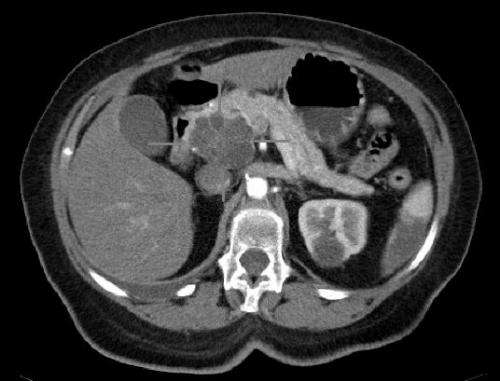A microRNA may provide therapy against pancreatic cancer

Indiana University cancer researchers found that a particular microRNA may be a potent therapeutic agent against pancreatic cancer. The research was published June 22 in the journal Scientific Reports.
Led by Janaiah Kota, Ph.D., assistant professor of medical and molecular genetics at the IU School of Medicine and a researcher at the Indiana University Melvin and Bren Simon Cancer Center, the researchers found that restoring missing microRNA-29 (miR-29) in pancreatic cancer stromal cells reduced the viability and growth of the cancerous cells.
A thick fibrotic shell around the cancer cells is known as "stroma," which protects the pancreatic cancer cells from anticancer drugs such as chemotherapy.
"We found that the loss of miR-29 is a common phenomenon of pancreatic cancer stromal cells, and that by restoring it, the stromal accumulation and cancer growth was reduced," Kota said. "The use of miR-29 as a therapeutic agent may be more effective in targeting reactive stroma, as a single miRNA regulates the expression of several genes associated with disease mechanisms."
"In healthy cells and tissues, a single miRNA controls the expression of hundreds of genes, and any alterations in their normal expression leads to abnormal overexpression of bad genes that are favorable for the growth of cancer cells and are harmful to normal cells," Kota explained.
Kota and his colleagues were studying the role of small non-coding RNAs called miRNAs in molecular mechanisms associated with pancreatic cancer stroma to evaluate their use for therapeutic intervention in pancreatic cancer. They found that there is loss of miR-29 in stroma of the pancreatic tumors compared to the healthy pancreas. The researchers expected its expression in stromal cells would restore normal function of stromal cells and reduce the abundance of fibrotic stromal proteins. However, they were surprised that when they co-cultured miR-29 overexpressing stromal cells with cancer cells, it also reduced the viability and growth of cancer cells for unknown factors.
They are currently performing additional studies to understand the molecular mechanisms associated with the effect of miR-29 overexpression in stromal cells on cancer cells as well as in preclinical animal models.
"This is a novel approach that has the potential to overcome the problems associated with current anti-stromal drugs and that could lead to improved therapeutic strategies, enhanced drug delivery to the tumor bed, and, in the future, improved patient survival," said Murray Korc, M.D., the Myles Brand professor of cancer research at the IU School of Medicine and a researcher at the IU Simon Cancer Center. Korc is also director of the Pancreatic Cancer Signature Center.
The need for new therapies for pancreatic cancer patients is great as only 7 percent of people with the disease survive more than five years after diagnosis. According to the National Cancer Institute, there will be an estimated 48,960 new cases of pancreatic cancer and 40,560 deaths from the disease in 2015.














